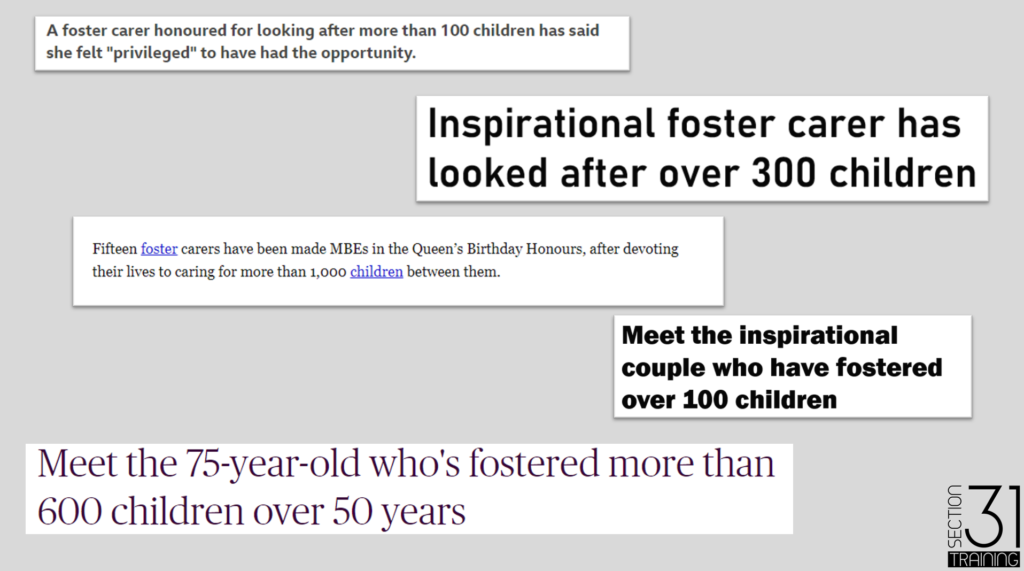
Over the years I have seen many stories in the media regarding foster carers who have received awards or recognition for the time they have devoted to fostering children. Although on the surface this is great, almost all of these stories focus on the amount of children that a foster carer has cared for.
It is strange to me how society and mainstream media defines a super carer solely by the amount of children they have had through their doors rather than any reparative work they may have done. It’s like people think that if you put a roof a child’s head for a few nights you have saved the world and that somehow this is, on its own, inspirational. I remember reading one article that spoke about 15 foster carers who received an MBE for, according to the article, caring for “more than 1,000 children between them”, again the focus was on the numbers rather than the actual work that has been done.
Now don’t get me wrong, I am not putting down these carers, I do not wish to discredit what they have achieved and I do believe that the work they have done for children is something we should admire and give them credit for. Many carers provide short breaks or respite care, many stand as a stepping stone for adoption, reunification or other arrangements. Carers offering these kinds of short term placements do tend to have a large amount of children enter and leave their homes during their time fostering, especially if they have been fostering for many years. These types of placements are needed just as much as long term placements.
The issue I have is not with short term / respite carers, my issue is with how the media and society celebrates fostering success purely on the amount of kids carers have had present in their homes and the lack of recognition for those who maintain long term placements that last years.
The role of a foster carer is massively misunderstood by society and it is evident that mainstream media hasn’t got a clue about what foster carers actually do. In reality, foster carers and their families often sacrifice a great deal to foster and their role can be at times very emotionally testing. There is a huge list of things that both short term and long term foster carers should be accredited and recognised for and the number of kids they have had is most definitely not their greatest achievement.
When it comes to fostering it should never be about the numbers, it should be about the individual children involved and their unique journeys. A positive impact on one persons life should be valued just as much as those who have impacted many.

A selection of articles found from a quick google search. Fostering success is defined within the media by numbers.
As I have mentioned many times in previous blogs and speeches, the majority of kids in care are in this system for the long haul. For these children and young people, reunification is not an option, adoption is not an option and long term foster care is the only option left. Many of these children become drifters in the system, moving from home to home, experiencing loss after loss, each broken attachment compounding their trauma even further.
These children need more than just a roof over their head, they need people who provide stability, consistency, patience and understanding over a long period of time. For many of them, the only chance they will ever have of having anything close to a normal family life is for people to take them in and stick with them through thick and thin.
I spent 24 years living within this system and for 10 years I have worked within it. During my time working in the system professionally I have had the privilege of meeting quite literally thousands of foster carers. Many of these foster carers care for a small number of children long term. I have met many carers who have only ever had one child in placement and they have stuck by that child for 5 or 10 years. I have met carers who have taken on sibling groups and cared for them throughout their journey preventing them from being torn apart. I have met carers who continue to support the young people they care for way beyond when services end, way beyond what their role expects of them. I have met carers who spend every waking moment fighting for children to have their rights exercised and I have met carers who have put their job on the line to prevent injustices towards the children in their care.
These carers provide concrete foundations for children who otherwise would be drifting in the system, they take on that child’s past, they accept them for who they are and fight for a better future. This isn’t just a job for them, it is a commitment that they make, driven by a passion to make a real difference to children in need of alternative care.
For me, these are the super carers. Maintaining placements for that amount of time is not easy, however the impact of sticking with children for that long can be positively life changing.
Many kids drifting in this system are enduring a seemingly perpetual internal battle, wanting love more than anything but equally, love being something they fear the most because they have learned that everyone they grow to love will leave or be taken. It is not uncommon for children in care to push away those who are trying to help them. I can tell you from my own experience of being in care that I would often attack those I loved the most. I didn’t really realise that is what I was doing at the time but I can see it now as and adult looking back. The thing is, when you have been let down by so many and passed from home to home you learn that the more someone means to you the more it hurts when that person leaves your life. You also learn that they WILL leave because, that is how it has always been, that is what everyone has done before.
There are so many children out there who are just like the child I used to be, drifting through the system, wanting love but pushing it away when they get it. Sadly there are many who never find their secure base, who never find solid ground and many of them continue that cycle after they leave care into their adult life. However there are also many who have seen an end to this cycle by being placed with carers who stuck with them through the “push” stage, standing by them and showing them that they are not going anywhere.
Children who have experienced multiple placement moves, let downs and complex traumas will have developed protective mechanisms / trauma responses more commonly referred to in the system as “challenging behaviours”. Children who express such behaviours are often considered “difficult to place” and they are often the ones who find themselves being passed from home to home living a transient existence.
There are people who have said to me in the past that its only the “good kids” who stay in the same placement that long, it is only the ones who are well behaved. This is an unfair statement to make. Of all of the foster carers I have known over the years nearly all of them have had to endure a great deal to maintain that level of stability. Regardless of a persons level of understanding it takes a great deal of strength and resilience to ride that storm out. On top of this, many foster carers find themselves working within a system that at times does not seem to put the child at the heart of decision making, a system that does not always work in children’s favour and in these incidences many carers find that they have to fight hard to ensure a child gets what they need.
There are many foster carers out there who have taken “hard to place” children into their home and stuck with them. They have stopped them drifting in the system and I rarely see these carers credited for what they have done, in fact what I often see is carers being shunned or downtrodden by professionals for standing up for the children they have grown to love. In short it is carers like this that saved my life and it is carers like this that save the lives of many others. Sticking by someone and proving to them they are worthy of love and care is a great healer.

Many foster cares stick with children through everything, fighting for them till the very end
There are many types of fostering which include:
- Short-term
- Parent & Child (Mother & Baby)
- Bridge to Foster
- Long-term fostering
- Respite foster care
- Remand Fostering
- Fostering babies
The majority of foster carers are doing more than one type of fostering simultaneously. Many foster carers who are doing long-term fostering are also providing short / emergency placements to other children as well. Many of those who are shown in the media for having “hundreds” of children have also had long term enduring placements too alongside the short term placements. These articles we see rarely mention that because of course society believes that foster carers are merely bed providers and the focus is on the figures.
I think that one of the reasons the media and society focusses so much on numbers is because numbers are measurable. To people that do not understand the fostering world, “I’ve had 100 kids” sounds more amazing than “I’ve had one kid” I suppose. Changing societies perception of foster care is a mammoth task and really I don’t think society is ever really going to understand the world of foster care.
What I don’t want people to think is that numbers are everything. If you have fostered 100 children you are amazing. If you have fostered one child you are amazing. Numbers may be how society measures fostering success but for those who are actually fostering, please, stop counting, it is not a competition. Fostering success is actually extremely hard to measure because often as a foster carer, you may not see the true impact of what you have really done, you may never see the deeper impact.
There are many people in my life that planted seeds. These seeds may not have all sprouted whilst I was in their care but years later they did and those seedlings grew and grew later on. Now I am a mighty oak and I am grateful for those who tried their best to help me. Many of these people gave absolutely everything and expected nothing in return. I have since gone back and found these people and made them aware of what they did to help and I have thanked them but even then, they didn’t want an award, they just wanted me to be ok and were so happy to learn that I was.
I guess really that’s what is all about. Foster carers give everything and rarely are they credited enough for everything they give but that is not what foster carers are doing this for. Of all the foster carers I have ever met nearly all of them just want children to be ok. Some keep children safe for a night or a week to make sure they are ok, some hold on tight for years and years to make sure they are ok. Wether you have had 1 or 1000 children, it doesn’t matter. What matters is for foster carers to provide children with what they need at the time they need it.
I believe that foster carers should be recognised by the time they give and the work they do rather than the numbers of kids that have entered and left their home.


This is so refreshing to read. I think long term carers can feel quite isolated from their LAs or IFAs, I say this as a long term carer of a sibling group who we joined in becoming a family over 8 years.
We were their first carers and are now long term carers for them (or as we think of it, we are just a family).
We have seen so many children bumped along from ‘placement’ to ‘placement’ for mostly reasons I fail to understand and it is heartbreaking.
Children need a family, family is made up of different people not always having to share dna, we all need consistency, love and to feel valued. How can children who are constantly moved ever feel anything but alone?
Very true words. Everyone who takes a child into their home will add something to that child’s life experiences. From my experience it is how they grow into adulthood which really reflects the level of care they have received. For a child to feel they are part of your family, that they belong, and they still return to you later in life, that is more meaningful than any awards.
I am one of the foster carers who were lucky to be honoured in the Queen’s 2020 honours for an MBE. I have had a few placements short term and had 4 years doing parent & child i have had a long term placement which lasted for 5 years but unfortunately it did break down and I was devastated it could not be rectified but I will say the girls are still involved in my life now and they are the ones who put my name forward for my award. I have three gorgeous children in a long term placement they have lived with me and all my family for 6 years we have lots of ups and downs but we get through them after the teenagers stop sulking 😁it’s a normal family home and they and my other girls are part of our lives. I felt I didn’t deserve the MBE but it’s for my husband and children too who’s lives have revolved around fostering for over 18 years and more years to come.
Maureen Hughes MBE
Maureen, of course you deserved the MBE!, foster carers deserve recognition. I just wish that the focus was on the amazing work you have done over those years not just on the figures. I hope this post did not make you feel looked down upon at all, this was not my intention and I tried to be mindful whilst writing it. When the focus is on numbers it misrepresents what fostering is and is misleading to new carers coming in. I just want to society to better understand what fostering is and what foster carers actually put in to this role. I have a huge amount of respect for all foster carers, as I said in the post, the issue I have is societies view on fostering. I don’t want people to think that the only way to get recognised is by a high placement count. I hope that makes sense x
Thank you Scott for the lovely reply and you are right fostering is not about numbers. Maureen x